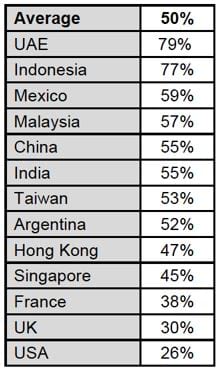Parents in Malaysia are not cutting the financial umbilical cord, with 57% of people with children over the age of 18 still giving them regular financial support, according to HSBC’s new The Power of Protection study, Facing the future.
The study highlights parents’ ongoing commitment to their children, as well as the financial pressures faced by younger generations. The Power of Protection is an independent consumer research study into global protection needs and trends, commissioned by HSBC. It provides authoritative insights into people’s concerns about the future and how they are protecting themselves financially, around the world.
This report, Facing the future, is the third in the series and represents the views of 13,122 people in 13 countries and territories: Argentina, China, France, Hong Kong, India, Indonesia, Malaysia, Mexico, Singapore, Taiwan, UAE, UK and USA. For the Malaysian findings, the survey was conducted on a sample of 1,000 people aged 25 and over.
Parents still supporting grown-up children
The study uncovered that parents in Malaysia are ranked fourth globally in financially supporting children into adulthood. The UAE tops the global table of the highest proportion of parents still supporting grown-up children.


Children are for life
The study in Malaysia shows it is very common for parents to be supporting children well into adulthood. Almost half (50%) of those supporting an adult child have been doing so despite most parents (64%) who support grown-up children, believed that their children should stand on their own two feet financially when grown up.
Education is the area where most parents (69%) are providing financial support, while 41% are helping with everyday living costs such as utility bills, groceries and home repairs. They are also helping with medical and dental care (38%) and rent/accommodation costs (27%). Over one in four (29%) are even helping to paying for holidays.
Most parents supporting grown-up children feel good about helping their family, with 62% feeling appreciated for the support they give others and 63% feeling they are a good provider for their family.
The cost of caring
Providing this ongoing financial support comes at a cost, but it appears to be one that most parents prioritise. Parents are spending an average 33% of their disposable income on supporting their grown-up children and 49% are spending less on themselves in order to have more for their families.
However, there can be significant knock-on effects to parents’ long-term financial planning. Sixty-seven percent of parents supporting adult children would prioritise paying for their child’s university/higher education over their own retirement fund, and 30% had to withdraw from their own savings and investments to support an adult child, while 17% have incurred more debt.
A significant minority of parents say their adult children would not manage at all financially if they themselves developed a long-term illness or disability (22%), if they had to significantly reduce their financial support to them (16%) or if they were unable to work (16%).
Yet 54% of parents supporting grown-up children do not have insurance that would pay them if they had a serious illness or accident that prevented them from working, and 52% do not have life insurance.
According to Lim Eng Seong, Country Head, Retail Banking and Wealth Management, HSBC Bank Malaysia: “With parents supporting their children for longer, it is important to have a financial plan that considers competing priorities and future financial security. Thinking about what is important in your life today, what you want to protect for the future, and seeking professional advice, are good first steps to putting a plan in place.
“As the cost of living rises higher, parents would have the additional burden of supporting their grown-up children and it is important they have enough to take on this additional cost. Planning for it from now would be a positive step for them. It is always important to have a financial contingency plan and it is never too late to check on what are the options available to ensure one’s financial future is secure”.
Practical steps
Based on the research findings, HSBC has identified four actions which can help people better prepare their family to face the future:
1. Identify your priorities
Think about your priorities in life. Make sure you have a financial plan in place that addresses your needs as well as those of your family. Don’t neglect your own aspirations when planning for the future.
2. Assess your finances
Consider how financially secure you feel. Think about whether any financial support you are giving to others is likely to increase or decrease in the future and if you need to update your financial plan.
3. Plan for the whole family
Unexpected life events can have knock-on effects for the whole family. Bear this in mind when reviewing if you have enough financial protection in place.
4. Talk about the future
Make time to talk to your family about the future. Discuss what could happen to them if you were to experience a life-changing circumstance and what financial safeguards you have in place. If you need help, seek professional advice.



